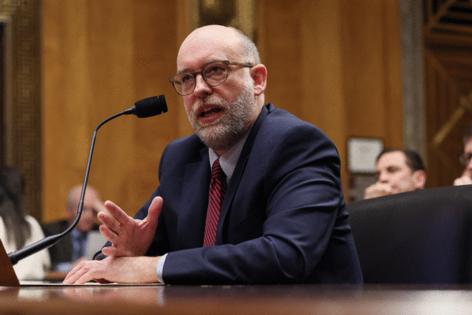Vought gets chilly reception from Senate Homeland Security Democrats
Published in News & Features
WASHINGTON — Democratic senators got some support from Senate Homeland Security and Governmental Affairs Chairman Rand Paul as they quizzed Russ Vought, President-elect Donald Trump’s nominee for budget director, about lawmakers’ “power of the purse.”
Paul, R-Ky., said he was “sympathetic” to Democrats’ arguments about the limited budgeting authority available to presidents under Article I of the Constitution. And Paul said while he supports Vought’s nomination, “unless the new administration has the courage to tackle entitlement reform, the national debt will continue to explode.”
During Vought’s confirmation hearing Wednesday, Democrats said Trump in his first term violated the 1974 budget law, which restricts the ability of presidents to “impound,” or not spend, funds appropriated by Congress.
Vought led the Office of Management and Budget in 2019 when it temporarily withheld more than $200 million in aid to Ukraine, which the Government Accountability Office said was a violation of the impoundment law. Trump budget officials said they withheld the funding to review its use in relation to the president’s foreign policy.
Gary Peters, D-Mich., the ranking member of the committee, asked Vought if he would commit to follow the law “and not allow OMB to withhold funding from programs that Congress has appropriated.”
Vought agreed that the 1974 law is “the law of the land” but added that Trump in his campaign for president said he believes the impoundment provisions are unconstitutional.
“The president has run on the issue of impoundment and has reminded the country that 200 years of presidents have used this authority,” he said. “We’ll be developing our approach to this issue and strategy” after the new administration begins.
Vought argues that presidents under some circumstances are allowed to spend less than Congress has appropriated if they are able to accomplish the objectives of a law with less money. Presidents also are allowed to transfer funds if permitted in appropriations legislation.
Paul, however, said, “I think if we appropriate something for a cause, that is where it is supposed to go, and that will still be my position.”
Paul added, though, that there is “some debate over transfer authority and moving money and what you’re allowed to do and what you’re not allowed to do.” He said part of the problem is that Congress has given the president too much power “regardless of party.”
“If we want to limit what the president does with moving money around, which I’m sympathetic to … we have to write better legislation,” Paul said. “Every piece of legislation that we put out has a presidential waiver for national security.”
Democrats argued that the courts in past decisions have ruled against a president impounding funds. Former Trump aides have countered that the Supreme Court has never ruled on whether the impoundment restrictions in the 1974 law are constitutional.
Richard Blumenthal, D-Conn., said he was “astonished and aghast that someone in this responsible of a position would in effect say that the president is above the law and that the United States Supreme Court is entitled to their opinion but mine should supersede it.”
Ukraine aid, veterans, Great Lakes
In response to other questions, Vought said the new administration would release enacted disaster relief funds that were “appropriately” funded. But he left the door open on some $3.8 billion in enacted security assistance for Ukraine, saying he would not “get ahead of the president on a foreign policy issue.”
Vought declined to say whether he would support a means test to determine whether veterans are entitled to veterans disability compensation. “The president has been a firm supporter of veterans spending, of getting veterans everything they need,” he said in response to a question from Blumenthal.
Several Democrats questioned Vought about positions he advocated as president of the Center for Renewing America, a think tank he founded after Trump left office.
He said those positions were not “the agenda of the incoming president,” adding that his job if confirmed would be to “take what the president wants to do, what he ran on … and figuring out how to best implement it and to do it in the most efficient manner.”
Vought said he doesn’t favor a government shutdown and wants to start the appropriations process as early as possible “so you don’t have the kind of pileups at the end of the fiscal year that we have seen.”
In response to questions from Maggie Hassan, D-N.H., Vought said he would commit to making sure no agency would evaluate an application for a grant “with the applicant’s political identity or views in mind.”
“If it’s the law of the land, absolutely,” he said. “We have no business in trying to engage in understanding someone’s political views.”
Freshman Sen. Elissa Slotkin, D-Mich., asked Vought what he would do in the future about the Great Lakes Restoration Initiative, a law set to expire at the end of fiscal 2026 that provides hundreds of millions of dollars a year to protect the bodies of water.
Slotkin said when Vought was at OMB, “you in three out of four budgets” proposed to eliminate funding for it. Vought said he would be happy to “work with you on your viewpoints.”
But as with other questions about future budget actions, Vought declined to answer, saying he was “not going to get ahead of the budget process.”
Paul, who said after the hearing that “there is no doubt he will be swiftly confirmed,” has noticed a committee vote on Vought’s nomination for Monday, which is also Inauguration Day.
In addition to Paul’s panel, the Senate Budget Committee has jurisdiction. Chairman Lindsey Graham, R-S.C., has scheduled that committee’s hearing on Vought for Jan. 22.
_____
©2025 CQ-Roll Call, Inc., All Rights Reserved. Visit cqrollcall.com. Distributed by Tribune Content Agency, LLC.







Comments